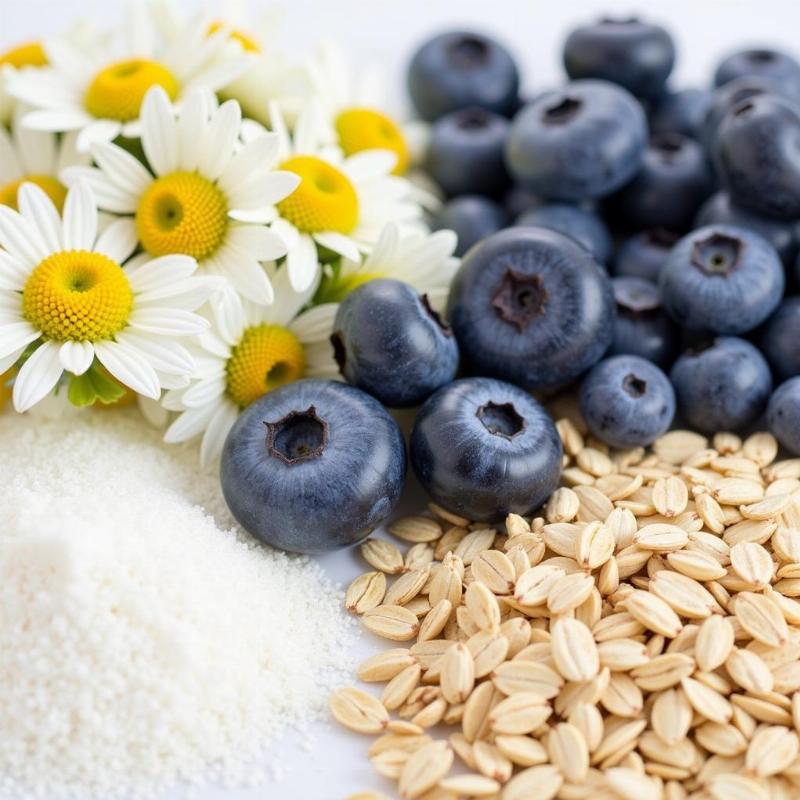A bright, white coat on a dog is truly a beautiful sight. But maintaining that pristine white can be a challenge. Whether you’re dealing with muddy paws, tear stains, or just the general grime of everyday life, finding the right dog shampoo for white coats is crucial. This article will guide you through everything you need to know to keep your furry friend looking their best.
Choosing the right dog shampoo for white coats isn’t just about aesthetics; it’s about the health of your dog’s skin and fur. Using a product specifically formulated for white coats can help prevent yellowing and staining, while also addressing common issues like dryness and irritation.
Best Shampoos for White Coats: What to Look For
When searching for the perfect dog shampoo for white coats, consider these key factors:
- Brightening agents: Look for shampoos containing natural brighteners like chamomile, blueberry, or oatmeal. These ingredients can help enhance the whiteness of the coat without harsh chemicals.
- Gentle formulas: White-coated dogs can have sensitive skin. Opt for hypoallergenic and pH-balanced shampoos to avoid irritation and dryness.
- Stain removal properties: Shampoos with enzymes or mild bleaching agents can help tackle tough stains from dirt, grass, and food.
- No harsh chemicals: Avoid shampoos containing parabens, sulfates, and artificial fragrances, which can irritate sensitive skin and strip natural oils.
 Dog Shampoo Ingredients for White Coats
Dog Shampoo Ingredients for White Coats
Addressing Common White Coat Problems: Stains and Yellowing
White coats are particularly susceptible to staining and yellowing. Here are some common culprits and how to address them:
- Tear stains: These reddish-brown streaks around the eyes can be caused by excessive tear production or the presence of porphyrins in tears. Look for shampoos specifically designed to address tear stains, often containing ingredients like boric acid or colloidal silver.
- Urine stains: Urine can discolor white fur, leaving yellowish patches. Regular bathing with a whitening shampoo and prompt cleaning of accidents can help prevent this issue.
- Mud and dirt: Active dogs are prone to getting dirty. A good dog shampoo for white coats should effectively lift dirt and grime without stripping the coat’s natural oils.
Bathing Your White-Coated Dog: Tips and Tricks
Bathing a white-coated dog requires a little extra care. Follow these tips for optimal results:
- Brush before bathing: Remove loose hair and mats to ensure the shampoo reaches the skin effectively.
- Use lukewarm water: Avoid hot water, which can dry out the skin and coat.
- Dilute the shampoo: This helps distribute the product evenly and prevents overuse.
- Rinse thoroughly: Leftover shampoo can lead to dullness and irritation.
- Dry completely: Damp fur can attract dirt and lead to matting. Towel dry and use a low-heat dryer if necessary.
Choosing the Right Shampoo for Your Dog’s Specific Needs
While all white-coated dogs benefit from a specialized shampoo, individual needs can vary.
- Sensitive skin: Choose a hypoallergenic, fragrance-free formula.
- Dry coat: Look for shampoos with moisturizing ingredients like aloe vera or coconut oil.
- Puppies: Opt for a gentle, tear-free puppy shampoo.
Conclusion
Maintaining a sparkling white coat requires the right dog shampoo and proper bathing techniques. By following the tips outlined in this article, you can keep your canine companion looking their best. Remember to choose a shampoo formulated specifically for white coats, addressing individual needs such as sensitive skin or dryness. With a little care and attention, your dog’s white fur will be the envy of the neighborhood.
FAQs
- How often should I bathe my white-coated dog? Generally, every 4-8 weeks is sufficient, unless your dog gets particularly dirty.
- Can I use human shampoo on my dog? No, human shampoo is formulated for a different pH balance and can irritate a dog’s skin.
- What can I do about stubborn stains on my dog’s white coat? Consult a groomer or veterinarian for professional advice and stain removal products.
- Are there any home remedies for whitening a dog’s coat? Some owners use diluted baking soda paste or apple cider vinegar rinses, but always consult with a veterinarian before trying home remedies.
- My dog’s white coat is turning yellow. What should I do? This could indicate a health issue. Consult a veterinarian to rule out any underlying medical conditions.
- Are certain breeds more prone to staining than others? Yes, breeds with white fur around the eyes, mouth, and paws are generally more susceptible to staining.
- Can diet affect the whiteness of my dog’s coat? A balanced diet contributes to overall health, including skin and coat health.
Related Articles:
best professional dog grooming shampoo
dry shampoo for dogs homemade
dogs that are hypoallergenic for sale
why do dogs get white hair
silver honey shampoo for dogs
About Beautdogs.us: Beautdogs.us is your premier online resource for all things dog-related in the US. We offer expert advice on dog breeds, grooming, health, and lifestyle. From finding the best dog shampoo for white coats to understanding the nuances of different breeds, we’re here to help you provide the best possible care for your canine companion. Contact us for personalized guidance: Email: [email protected], Phone: +1 501-555-7529.